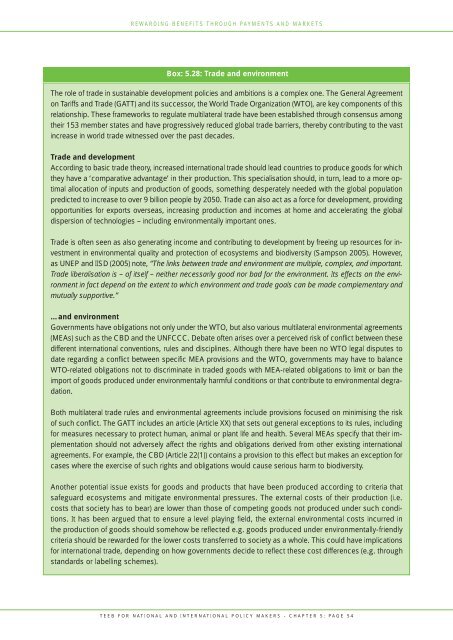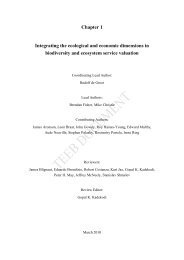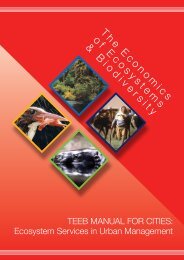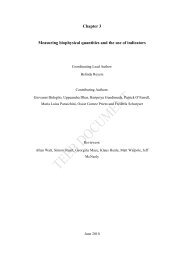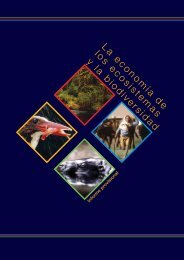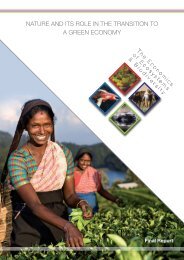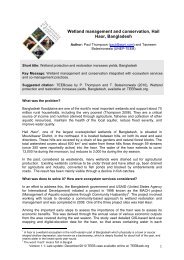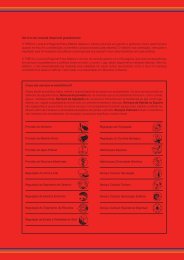Download (PDF, 6.71MB) - TEEB
Download (PDF, 6.71MB) - TEEB
Download (PDF, 6.71MB) - TEEB
Create successful ePaper yourself
Turn your PDF publications into a flip-book with our unique Google optimized e-Paper software.
REWARDING BENEFITS THROUGH PAYMENTS AND MARKETS<br />
Box: 5.28: Trade and environment<br />
The role of trade in sustainable development policies and ambitions is a complex one. The General Agreement<br />
on Tariffs and Trade (GATT) and its successor, the World Trade Organization (WTO), are key components of this<br />
relationship. These frameworks to regulate multilateral trade have been established through consensus among<br />
their 153 member states and have progressively reduced global trade barriers, thereby contributing to the vast<br />
increase in world trade witnessed over the past decades.<br />
Trade and development<br />
According to basic trade theory, increased international trade should lead countries to produce goods for which<br />
they have a ‘comparative advantage’ in their production. This specialisation should, in turn, lead to a more optimal<br />
allocation of inputs and production of goods, something desperately needed with the global population<br />
predicted to increase to over 9 billion people by 2050. Trade can also act as a force for development, providing<br />
opportunities for exports overseas, increasing production and incomes at home and accelerating the global<br />
dispersion of technologies – including environmentally important ones.<br />
Trade is often seen as also generating income and contributing to development by freeing up resources for investment<br />
in environmental quality and protection of ecosystems and biodiversity (Sampson 2005). However,<br />
as UNEP and IISD (2005) note, “The links between trade and environment are multiple, complex, and important.<br />
Trade liberalisation is – of itself – neither necessarily good nor bad for the environment. Its effects on the environment<br />
in fact depend on the extent to which environment and trade goals can be made complementary and<br />
mutually supportive.”<br />
…and environment<br />
Governments have obligations not only under the WTO, but also various multilateral environmental agreements<br />
(MEAs) such as the CBD and the UNFCCC. Debate often arises over a perceived risk of conflict between these<br />
different international conventions, rules and disciplines. Although there have been no WTO legal disputes to<br />
date regarding a conflict between specific MEA provisions and the WTO, governments may have to balance<br />
WTO-related obligations not to discriminate in traded goods with MEA-related obligations to limit or ban the<br />
import of goods produced under environmentally harmful conditions or that contribute to environmental degradation.<br />
Both multilateral trade rules and environmental agreements include provisions focused on minimising the risk<br />
of such conflict. The GATT includes an article (Article XX) that sets out general exceptions to its rules, including<br />
for measures necessary to protect human, animal or plant life and health. Several MEAs specify that their implementation<br />
should not adversely affect the rights and obligations derived from other existing international<br />
agreements. For example, the CBD (Article 22(1)) contains a provision to this effect but makes an exception for<br />
cases where the exercise of such rights and obligations would cause serious harm to biodiversity.<br />
Another potential issue exists for goods and products that have been produced according to criteria that<br />
safeguard ecosystems and mitigate environmental pressures. The external costs of their production (i.e.<br />
costs that society has to bear) are lower than those of competing goods not produced under such conditions.<br />
It has been argued that to ensure a level playing field, the external environmental costs incurred in<br />
the production of goods should somehow be reflected e.g. goods produced under environmentally-friendly<br />
criteria should be rewarded for the lower costs transferred to society as a whole. This could have implications<br />
for international trade, depending on how governments decide to reflect these cost differences (e.g. through<br />
standards or labelling schemes).<br />
<strong>TEEB</strong> FOR NATIONAL AND INTERNATIONAL POLICY MAKERS - CHAPTER 5: PAGE 54


